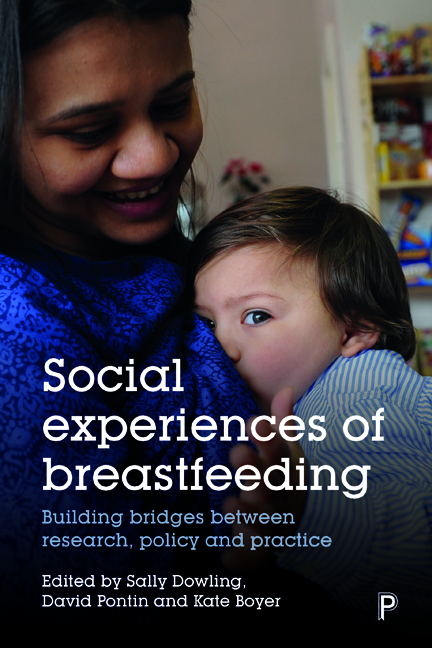Book contents
- Frontmatter
- Dedication
- Contents
- List of tables and figures
- Notes on contributors
- Acknowledgements
- Introduction
- The UK policy context: reconfiguration of the Unicef UK Baby Friendly Initiative to reflect the importance of relationships and ensuring sustainability
- Part I Breastfeeding and emotions
- Part II Cultures of breastfeeding
- Part III Breastfeeding and popular culture
- Conclusion
- Appendix: Schedule for ESRC Seminar Series: Social Experiences of Breastfeeding: Building bridges between research and policy, 2015–16
- Index
one - Managing the dynamics of shame in breastfeeding support
Published online by Cambridge University Press: 22 April 2022
- Frontmatter
- Dedication
- Contents
- List of tables and figures
- Notes on contributors
- Acknowledgements
- Introduction
- The UK policy context: reconfiguration of the Unicef UK Baby Friendly Initiative to reflect the importance of relationships and ensuring sustainability
- Part I Breastfeeding and emotions
- Part II Cultures of breastfeeding
- Part III Breastfeeding and popular culture
- Conclusion
- Appendix: Schedule for ESRC Seminar Series: Social Experiences of Breastfeeding: Building bridges between research and policy, 2015–16
- Index
Summary
Introduction
Our society has such a conflicted approach to breastfeeding that not only can women feel shamed for breastfeeding, they can also be shamed for not breastfeeding (Thomson et al, 2015). On the one hand, concerns about public feeding can invoke embarrassment or sexual shame about exposure for women, as well as feelings of disgust about visible lactation and hence shame about being disgusting (Dowling et al, 2012). On the other hand, women can feel shame when they decide not to breastfeed or find it difficult to establish breastfeeding (see the meta-synthesis by Burns et al, 2010).
In this chapter I examine research on women's experiences of breastfeeding which explores how shame might arise where they face challenges with this. I then consider what might be learned about breastfeeding support from a body of literature that has previously been overlooked in relation to infant feeding: the literature on shame and shame resilience. Exploring the differences between shame (feeling lesser in some way and unworthy of acceptance) and guilt (the sense that one has done something wrong), I explain why shame is more likely than guilt to lead to interpersonal problems, including difficulties in receiving support. The key argument in this chapter is that it is important to broaden the discussion of the emotional impact of not meeting breastfeeding expectations beyond the consideration of guilt (Taylor and Wallace, 2012). In doing so, those supporting and promoting breastfeeding can become attuned to the trickier interpersonal dynamics of shame and the sociocultural contexts which produce it.
The hidden nature of shame
It is only recently that breastfeeding researchers have turned their attention to shame (for example, Taylor and Wallace, 2012; Thomson et al, 2015). This may be because we do not often talk about shame in Western societies. We have become ashamed of our shame (Scheff, 2003), so that research on issues related to shame (for example, stigma, fear of rejection, fear of negative evaluation, lack of self-worth) does not often use the ‘S word’ (Scheff and Mateo, 2016). The literature on shame management and self-presentation (for example, Nathanson, 1997; Schlenker, 2012) also suggests that we often work hard to avoid shame. We may do this in a number of ways, such as constructing and presenting a desired identity, seeking affirmation, and saving face by concealment or strategic use of excuses, justifications, apologies and blame.
- Type
- Chapter
- Information
- Social Experiences of BreastfeedingBuilding Bridges between Research, Policy and Practice, pp. 23 - 38Publisher: Bristol University PressPrint publication year: 2018



